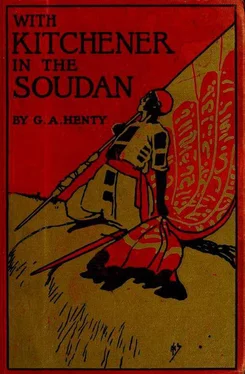" Is there any great force at Abu Hamed?"
"No; nothing that could stand against this for a moment. Their chief force outside Omdurman is at Metemmeh under Mahmud, the Khalifa's favourite son. You see, the Jaalin made fools of themselves. Instead of waiting until we could lend them a hand, they revolted as soon as we took Dongola, and the result was that Mahmud came down and pretty well wiped them out. They defended themselves stoutly at Metemmeh, but had no chance against such a host as he brought with him. The town was taken, and its defenders, between two and three thousand fighting men, were all massacred, together with most of the women and children. By the accounts brought down to us by men who got away, it must have been an even more horrible business than usual; and the Dervishes are past-masters in the art of massacre. However, I think that their course is nearly up. Of late a good many fugitives from Kordofan have arrived here, and they say that there will be a general revolt there when they hear that we have given the Dervishes a heavy thrashing."
" And where do you think the great fight is likely to take place? " Gregory asked.
" Not this side of Metemmeh. Except at Abu Hamed we hear of no other strong Dervish force between this and Omdurman. If Mahmud thinks himself strong enough, no doubt he will fight; but if he and the Khalifa know their business, he will fall back and, with the forces at Omdurman, fight one big battle. The two armies together will, from what we hear, amount to sixty or seventy thousand, and there is no doubt whatever that with all their faults the beggars can fight. It will be a tough affair, but I believe we shall have some British troops here to help before the final advance. We can depend now on both the Soudanese and the Egyptians to fight hard, but there are not enough of them. The odds would be too heavy, and the Sirdar is not a man to risk failure. But with a couple of brigades of British infantry there can be no doubt what the result will be, and I fancy that if we beat them in one big fight it will be all up with Mahdism.
" It is only because the poor beggars of tribesmen regard the Dervishes as invincible that they have put up so long with their tyranny. But the rising of the Jaalin, and the news we get from Kordofan, show that the moment they hear the Dervishes are beaten and Khartoum is in our hands there will be a general rising, and the Dervishes will be pretty well exterminated. We all hope that Mahmud won't fight, for if he does, and we beat him, the Khalifa and his lot may lose heart and retire before we get to Omdurman, and, once away, the tremendous business of trying to follow him will confront us. Here we have got the river and the railway, but we have no land carriage for an army, and he might keep on falling back to the great lakes for anything that we could do to overtake him. So we all hope that Mahmud will retire to Omdurman without fighting, and with such a host as the Khalifa would then have he would be certain to give battle before abandoning his capital."
" They are fine-looking fellows, these blacks," Gregory said.
"They are splendid fellows—they love fighting for fighting's sake. It is in their opinion the only worthy occupation for a man, and they have shown themselves worthy to fight by the side of our men. They have a perfect confidence in us, and would, I believe, go anywhere we led them. They say themselves, 'We are never afraid—just like English'."
" There seem to be a good many women about the camps."
"Yes, their women follow them wherever they go; they cook for them, and generally look after them. They are as warlike as their husbands, and encourage them, when they go out to battle, with their applause and curious quavering cries. The men get very little pay; but as they are provided with rations, and draw a certain amount for the women, it costs next to nothing, and I fancy that having the wives with them pays well. I believe they would rather be killed than come back and face their reproaches. I could not wish to have more cheery or better fellows with me. They never grumble, they are always merry, and really they seem to be tireless; they practically give no trouble whatever, and it is good to see how they brighten up when there is a chance of a fight."
" I hope I shall see them at it before long," Gregory said. " Now I must be going, for I have to change, and put on my mess uniform before dinner. I am rather nervous about that, for I am not accustomed to dine with generals."
" You will find it all very pleasant," the other said. " Hunter is a splendid fellow, and is adored by his men. His staff are all comparatively young men, with none of the stiffness of the British staff-officer about them. We are all young—there is scarcely a man with the rank of captain in the British army out here; we are all majors or colonels in the Egyptian army, but most of us are subalterns in our own regiments. It is good training for us. At home a subaltern is merely a machine to carry out orders; he is told to do this, and he does it; for him to think for himself would be a heinous offence. He is altogether without responsibility and without initiative, and by the time he becomes a field-officer he is hidebound. He has never thought for himself, and he can't be expected to begin to do so after working for twenty years like a machine. You will see, if we ever have a big war, that will be our weak point. If it wasn't for wars like this, and our little wars in India, where men do learn to think and take responsibility, I don't know where our general officers would get their training. Well, you must be going. Good-bye! we shall often meet; there are so few of us here that we are always running against each other. I won't ask you to dine with us for a few days, no doubt you would like to get accustomed to head-quarters mess first. Of course Hunter and the brigade staff dine together; while we have little regimental messes among ourselves, which I prefer. When there are only three or four of us, one can sit down in one's shirt sleeves, whereas at the brigade mess one must, of course, turn up in uniform, which in this climate is stifling."
The meal was a more pleasant one than Gregory had anticipated. On board the steamer he had, of course, dined with the other officers, and he found little difference here. Ten sat down, including the principal medical officer and a captain — the head of the station intelligence department, Major Wingate being at present at Wady Haifa. Except for the roughness of the surroundings, it was like a regimental mess, and the presence of the General commanding in no way acted as a damper to the conversation. General Hunter had, before sitting down, introduced him to all the members with a few pleasant words, which had put him at his ease. Gregory had, on his way up, learned a good deal as to the officers who were down at Cairo for their health, and he was able to say who were convalescent and who had sailed, or were on the point of sailing, for England. The table was formed of two long benches, and had been constructed by the engineers; it was laid under a large tent, of which the walls had been removed to give a free passage of air.
Although scarcely up to the standard of a mess dinner at home, it was by no means a bad one, consisting of soup, fish from the river, a joint of beef at one end and of mutton at the other, curried kidneys, sweet omelettes and cheese, whisky with water or soda to drink at dinner; and after the meal four bottles of claret were placed on the table, and cigars or pipes lit. Half an hour later four of the party sat down to whist, and the rest, going outside the tent, sat or threw themselves down on the sand, and smoked or chatted till it was time to turn in. Gregory's first step next morning was to buy a horse. This he purchased from some fugitives who had come down from Kordofan. It was a good animal, though in poor condition, and would soon pick up flesh when well attended and fed. To accustom himself to riding, Gregory went out on it for a couple of hours every morning, getting up before daybreak, so as to take exercise before the work of the day began. He also followed the example of the officers of the Egyptian regiments, and purchased a camel for the conveyance of his own baggage.
Читать дальше












